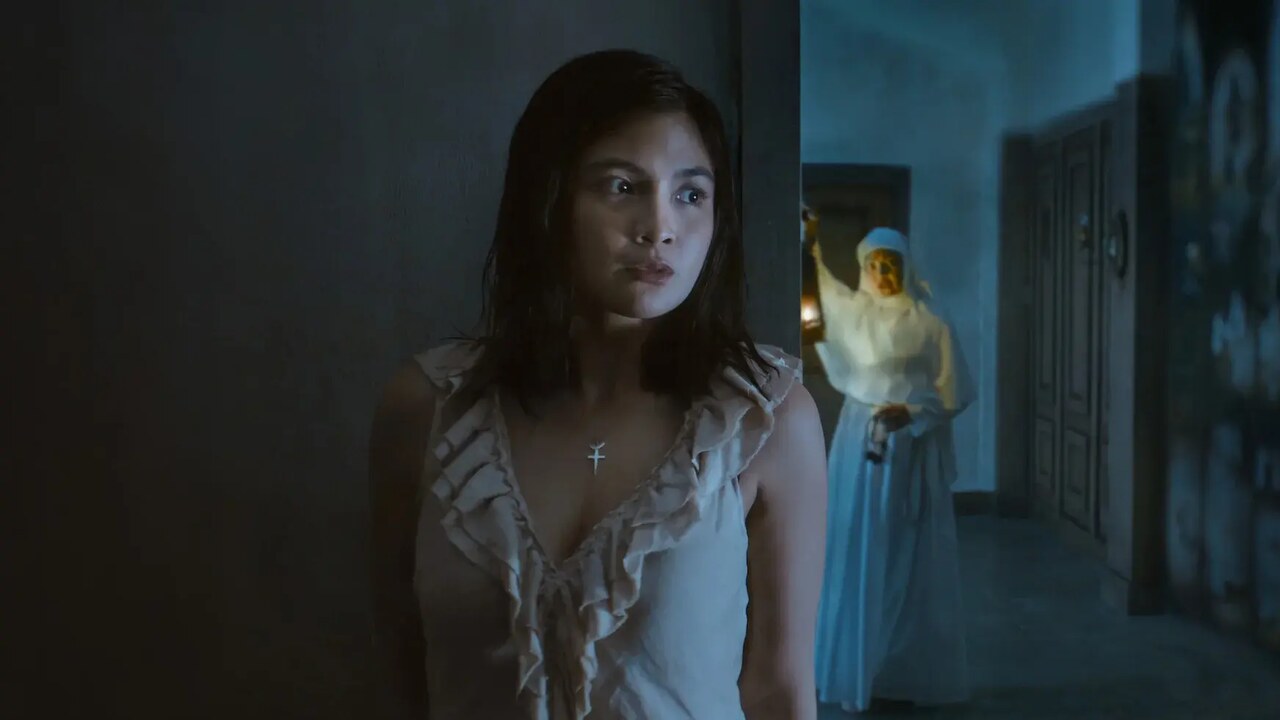
There’s no denying that Lilim tries to stand apart from the average jumpscare-driven horror flick. The film, set in a lonely orphanage deep in the mountains, makes good use of its isolated environment. The ominous chambers, illuminated ceremonies, and fog-shrouded wilderness feel textured and alive. You get the sense that something ancient lingers just beneath the surface—something wrong. Mikhail Red is skilled at mood. And in Lilim, he leans heavily into tone and aesthetics, with striking color palettes and a slow, creeping build that clearly wants to unnerve rather than shock.
Heaven Peralejo, who portrays the key character Issa, bears most of the film on her shoulders, and she does so admirably. Her acting is solid and emotionally realistic. Issa's tragedy, her protectiveness of her little brother, and her careful unraveling in this strange new environment are quietly captivating. Skywalker David as Tomas offers a subtle tenderness to the role, and they work together to create a genuine sibling connection that keeps the picture on track even when the storyline periodically deviates.
The opening half of the film establishes several themes: a violent history, an escape from danger, and a new beginning that rapidly exposes itself to be a different type of trap. The orphanage is overseen by nuns who appear benign at first glance, but things are not as they seem. Religious iconography, undertones of cult loyalty, and mysterious rituals all point to deeper evils. It's a promising concept, and for a time, Lilim delivers. But it doesn't.
While the film nails its tone, it fumbles its pacing. It takes far too long to get to its core horror. There’s a difference between slow-burn and sluggish, and Lilim too often falls into the latter. Scenes stretch without purpose. Some plot developments feel telegraphed. When the Lilim creature finally appears, it’s impressive in design but underwhelming in execution. The dread that had been simmering doesn’t quite boil over; it just… bubbles and stops. You’re left wishing the final third had matched the intensity and ambition of the buildup.
The supporting characters—especially the nuns—have potential but remain underwritten. Eula Valdez and Ryza Cenon are both excellent performers, and visually they’re commanding presences, but the script gives them little depth beyond vague menace and cryptic lines. Their motivations remain hazy, their backstories even more so, and the result is a set of antagonists who feel more symbolic than real.
Visually and technically, though, the film is consistently strong. Cinematography by Raymond Red gives us haunting tableaus and smart framing that draws attention to what’s seen—and what isn’t. The score hums with tension. Sound design creaks and clicks in all the right places.
There are themes here that feel important: abuse, religious extremism, and historical trauma. But they’re touched on more than explored. The film makes vague references to larger commentary—about institutions, power, and silence—but fails to flesh out those concepts in significant ways. The filmmakers appear to have known what they intended to communicate, but were unsure how to express it. As a result, the picture feels intellectual yet incomplete, ambitious but unclear.
Still, it isn't an awful movie. There are several effective moments, such as flashes of fear, character beats, and visual tension. Even if the scares aren't always effective, the feeling of location is. You recall the chilly stone hallways, the spooky chanting, and the flickering of candles in the church. You recall the sight in Issa's eyes as she realized she may have leaped from one nightmare to another.
In the end, Lilim is a horror picture with atmosphere and purpose, but it also has squandered possibilities. It's difficult because you can see the foundations of a wonderful film: the place, the cast, the concepts, and the tone. However, all of that potential never quite comes together to produce anything satisfactory. It doesn't conclude with a bang, but with a shrug. You are left admiring the effort but not moved or terrified by the outcome.
It’s not forgettable. It’s not unforgettable either. It’s somewhere in between. A horror movie that tries to say something, manages to look good doing it, but gets a little too lost along the way.
Final Score- [5/10]
Reviewed by - Anjali Sharma
Follow @AnjaliS54769166 on Twitter
Publisher at Midgard Times
Get all latest content delivered to your email a few times a month.
Bringing Pop Culture News from Every Realm, Get All the Latest Movie, TV News, Reviews & Trailers
Got Any questions? Drop an email to [email protected]